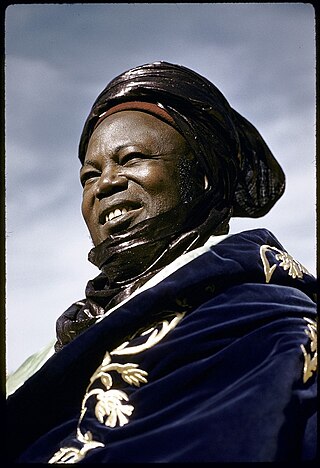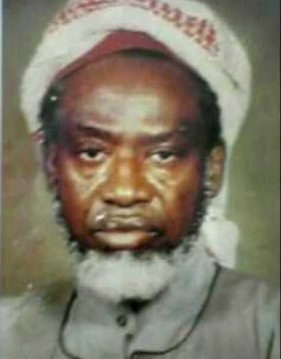
Sokoto is a major city located in extreme north-western Nigeria, near the confluence of the Sokoto River and the Rima River. As of 2006, it has a population of over 427,760. Sokoto is the modern-day capital of Sokoto State and was previously the capital of the north-western l states. Modern Sokoto is known for trading sheepskins, cattle hides, leather crafts, kola nuts and goatskins.

The Sokoto Caliphate, also known as the Sultanate of Sokoto, was a Sunni Muslim caliphate in West Africa. It was founded by Usman dan Fodio in 1804 during the Fulani jihads after defeating the Hausa Kingdoms in the Fulani War. The boundaries of the caliphate are part of present-day Cameroon, Burkina Faso, Niger, and Nigeria. By 1837, the Sokoto state had a population of around 10-20 million people, becoming the most populous empire in West Africa. It was dissolved when the British, French, and Germans conquered the area in 1903 and annexed it into the newly established Northern Nigeria Protectorate, Senegambia and Niger and Kamerun respectively.

Islam is one of the two largest religions in Nigeria. Nigeria also has the largest Muslim population in Africa. In 2018, the CIA World Factbook estimated that 53.5% of Nigeria's population is Muslim. Islam is predominantly concentrated in the northern half of the country, with a significant Muslim minority existing in the southern region. Most of Northern Nigeria is governed under Sharia law, while the rest of the country is governed under secular law.

Sir Siddiq Abubakar III, GCON, KBE was a Nigerian Muslim leader. He was the 17th Sultan of Sokoto between 17 June 1938 and 1 November 1988, making him the longest-reigning Sultan.

Sir Ahmadu Bello, famously known as Sardauna of Sokoto, was a conservative Nigerian statesman who was one of the leading northern politicians in 1960 and served as its first and only premier from 1954 until his assassination in 1966, in which capacity he dominated national affairs for over a decade.

Islam in Africa is the continent's second most widely professed faith behind Christianity. Africa was the first continent into which Islam spread from the Middle East, during the early 7th century CE. Almost one-third of the world's Muslim population resides in Africa. Muslims crossed current Djibouti and Somalia to seek refuge in present-day Eritrea and Ethiopia during the Hijrah ("Migration") to the Christian Kingdom of Aksum. Like the vast majority (90%) of Muslims in the world, most Muslims in Africa are also Sunni Muslims; the complexity of Islam in Africa is revealed in the various schools of thought, traditions, and voices in many African countries. Many African ethnicities, mostly in the northern half of the continent, consider Islam as their traditional religion. The practice of Islam on the continent is not static and is constantly being reshaped by prevalent social, economic, and political conditions. Generally Islam in Africa often adapted to African cultural contexts and belief systems forming Africa's own orthodoxies.

Islam in Niger accounts for the vast majority of the nation's religious adherents. The faith is practiced by more than 99.3% of the population, although this figure varies by source and percentage of the population who are classified as Animist. The vast majority of Muslims in Niger are Malikite Sunni. Many of the communities who continue to practice elements of traditional religions do so within a framework of syncretic Islamic belief, making agreed statistics difficult. Islam in Niger, although dating back more than a millennium, gained dominance over traditional religions only in the 19th and early 20th centuries, and has been marked by influences from neighboring societies. Sufi brotherhoods have become the dominant Muslim organization, like much of West Africa. Despite this, a variety of interpretations of Islam coexist—largely in peace—with one another as well as with minorities of other faiths. The government of Niger is secular in law while recognising the importance of Islam to the vast majority of its citizens.
Ibrahim Muhammadu Maccido Abubakar III, often shortened to Muhammadu Maccido, was the 19th Sultan of Sokoto in Nigeria. He was the son and primary aide to Siddiq Abubakar III (1903–1988) who had been the Sultan of Sokoto for 50 years.

Muhammadu Sa'ad Abubakar is the 20th Sultan of Sokoto. As Sultan of Sokoto, he is considered the spiritual leader of Nigeria's Muslims.

Alhaji Sir Usman Nagogo dan Muhammadu Dikko was Emir of Katsina from 19 May 1944, until his death. A Fulani from the Sullubawa Clan, he succeeded his father, Muhammadu Dikko, as Emir, and was succeeded by his son, Muhammadu Kabir Usman.

Abubakar Mahmud Gumi was a Nigerian Islamic scholar and Grand Khadi of the Northern Region of Nigeria (1962–1967), a position which made him a central authority in the interpretation of the Shari'a legal system in the region. He was a close associate of Ahmadu Bello, the premier of the Northern region in the 1950s and 1960s and became the Grand Khadi. In 1967, the position was abolished.
The Northern People's Congress (NPC) is a political party in Nigeria. Formed in June 1943, the party held considerable influence in the Northern Region from the 1950s until the military coup of 1966. It was formerly a cultural organization known as Jamiyaar Mutanen Arewa. After the Nigerian Civil War of 1967, the NPC subsequently became a minor party.
Islamic extremism is adherence to a fundamentalist interpretation of Islam, potentially including the promotion of violence to achieve political goals. In contemporary times, Islamic extremism in Northern Nigeria is typified by the Boko Haram insurgency and the proselytizing campaigns of Salafist groups such as the Izala Society.
Ibrahim Dasuki was the 18th Sultan of Sokoto, who was deposed in 1996 during the military government of Sani Abacha. Prior to becoming Sultan, he held the traditional title of Baraden Sokoto. Dasuki was the first Sultan from the Buhari line of the Fodiawa dynasty. He was a close associate of Ahmadu Bello, a friend of Abubakar Gumi and was influential in the founding of Jama'atu Nasril Islam.

Arewa House is a centre for research and historical documentations under Ahmadu Bello University, Zaria, located in Kaduna, Kaduna State, in Northwest Nigeria. It is also serves as a center for historical documentation and research of the Ahmadu Bello University, Zaria, Nigeria. Dr. Shuaibu Shehu Aliyu is the current director of the house.

Aliyu Makama Bida (1905–1980), MHA, CMG, CFR, OBE, CBE, was a Nigerian politician. He was the first Northern Minister of Education and Social Welfare, and later Minister of Finance and Treasurer of the NPC.
JNI is the Java Native Interface, a Java programming framework.
Islamic Education Trust is an Islamic Non-Governmental Organization established on 16th Ramadan 1379AH equivalent to 18 November 1969 and registered with the Federal Government of Nigeria in 1972 situated in Minna, Nigeria.
The Nigeria Supreme Council for Islamic Affairs (NSCIA) was established in 1973 at a national conference of Nigerian Muslim leaders in Kaduna under the auspices of Jama'atu Nasril Islam (JNI), the group for all the Islamic organisations in Northern Nigeria. In the South-West, prior to this conference, the first Muslim organisation to be formed after independence in 1960 was the United Muslim Council (UMC), but this was embraced by few Muslims in the Western Zone as it was championed by the ruling political party. According to Adegbite, the emergence and coming together of the Western Joint Muslim Organisation (WESJOMO), the Najah Joint Muslim Organisation (NAJOMO) and the Nigerian Muslim Council (NMC) of Lagos State enabled the region to work hand-in-hand with the JNI to create in 1973 the Nigerian Supreme Council for Islamic Affairs.
The National Board for Arabic and Islamic Studies is a government organization tasked with planning and implementing Arabic and Islamic studies curriculum in Nigeria. It was established in 1960 as an independent body then became a department in Ahmadu Bello University, Zaria, with activities mainly in the northern part of Nigeria. In 2011, the body was mandated to cover the entire country making it another examination body in Nigeria.










